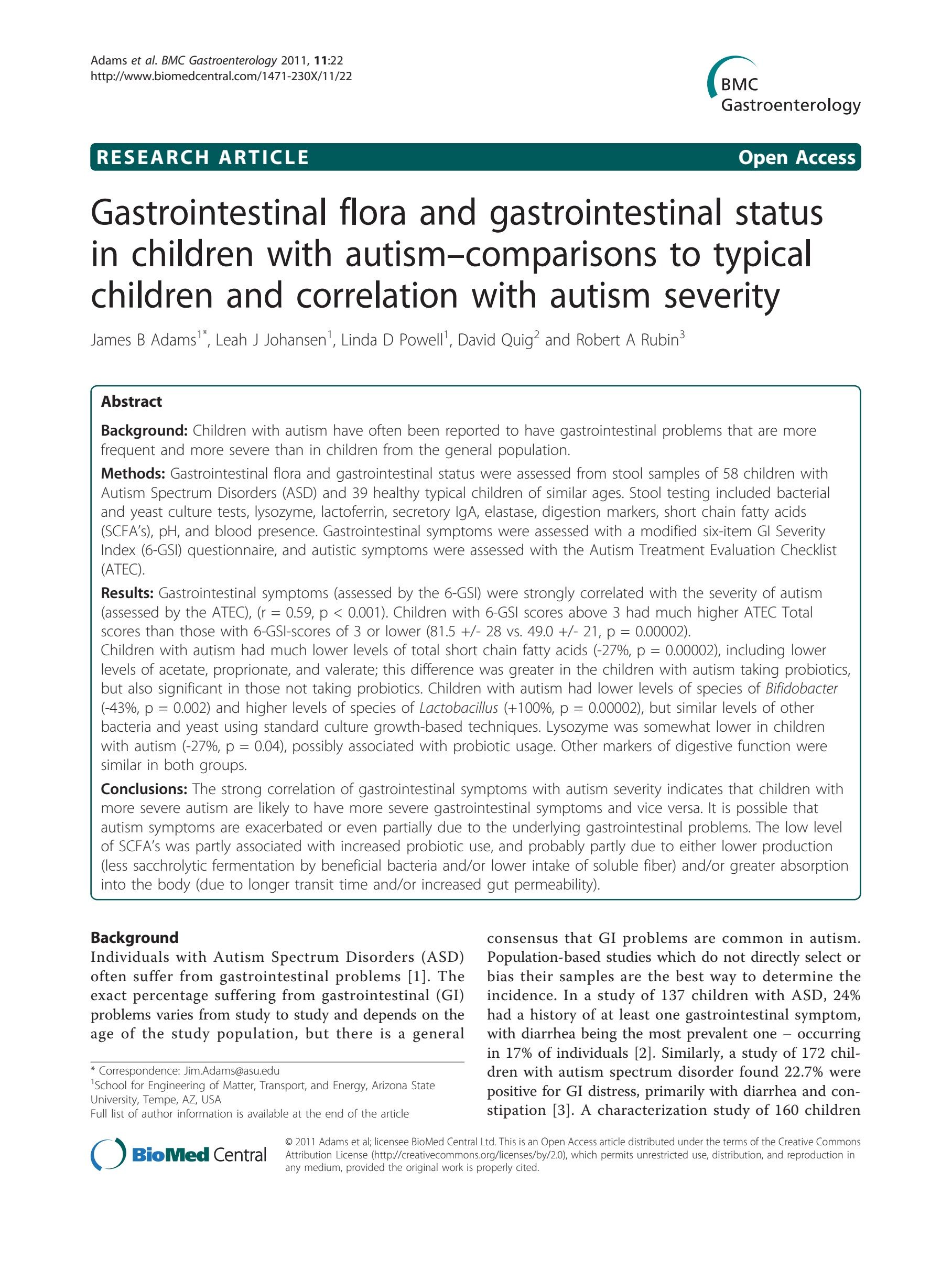
Otizmli çocuklarda gastrointestinal flora ve gastrointestinal durum - tipik çocuklarla karşılaştırmalar ve otizm şiddeti ile korelasyon
Arka plan: Otizmi olan çocukların, genel popülasyondaki çocuklara göre daha sık ve daha şiddetli gastrointestinal problemlere sahip oldukları sıklıkla rapor edilmiştir.
Yöntemler: Gastrointestinal flora ve gastrointestinal durum, Otizm Spektrum Bozukluğu (OSB) olan 58 çocuk ve benzer yaştaki 39 sağlıklı tipik çocuğun dışkı örneklerinden değerlendirildi. Dışkı testi, bakteri ve maya kültürü testleri, lizozim, laktoferrin, salgı IgA, elastaz, sindirim belirteçleri, kısa zincirli yağ asitleri (KZYA), pH ve kan varlığını içermiştir. Gastrointestinal semptomlar, değiştirilmiş altı maddelik GI Şiddet İndeksi (6-GSI) anketi ile değerlendirildi ve otistik semptomlar, Otizm Tedavisi Değerlendirme Kontrol Listesi (OTDK) ile değerlendirildi.
Sonuçlar: Gastrointestinal semptomlar (6-GSI tarafından değerlendirildi) otizmin şiddetiyle (OTDK tarafından değerlendirildi) güçlü bir şekilde ilişkiliydi (r = 0.59, p < 0.001). 6-GSI puanı 3'ün üzerinde olan çocuklar, 6-GSI puanı 3 veya daha düşük olanlardan çok daha yüksek OTDK toplam puanlarına sahipti (81.5 +/- 28'e karşı 49.0 +/- 21, p = 0.00002). Otizmli çocukların toplam kısa zincirli yağ asitleri (-%27, p = 0.0002) çok daha düşük seviyelerdeydi; buna daha düşük asetat, propiyonat ve valerat seviyeleri de dahildi; bu fark probiyotik alan otizmli çocuklarda daha fazla iken, probiyotik almayanlarda da anlamlıydı. Otizmli çocuklarda daha düşük Bifidobacter türleri (-%43, p = 0,002) ve daha yüksek Lactobacillus türleri (+%100, p = 0,0002) vardı, ancak standart kültür büyüme tekniklerine dayalı olarak kullanılan diğer bakteri ve maya seviyeleri benzerdi. Otizmli çocuklarda lizozim biraz daha düşüktü (-%27, p = 0.04) (muhtemelen probiyotik kullanımıyla ilişkili). Sindirim fonksiyonunun diğer belirteçleri her iki grupta da benzerdi.
Çözümler: Gastrointestinal semptomların otizm şiddeti ile güçlü korelasyonu, daha şiddetli otizmi olan çocukların daha şiddetli gastrointestinal semptomlara sahip olduklarını göstermiştir. Gastrointestinal problemlerin, otizm semptomlarının şiddetlendirmesi hatta otizm semptomlarına neden olması mümkündür. Otizmlilerdeki düşük KZYA seviyesi, kısmen artan probiyotik kullanımıyla ve muhtemelen kısmen ya daha düşük KZYA üretimi (yararlı bakteriler tarafından daha az sakrolitik fermentasyon ve/veya daha düşük çözünür lif alımı) ve/veya vücuda daha fazla absorpsiyon (daha uzun geçiş süresi ve/veya artan bağırsak geçirgenliği nedeniyle) ile ilişkilidir.
Makalenin tam metnine aşağıdaki bağlantıdan ulaşabilirsiniz: https://www.ncbi.nlm.nih.gov/pmc/articles/PMC3072352/
Gastrointestinal flora and gastrointestinal status in children with autism--comparisons to typical children and correlation with autism severity
Background: Children with autism have often been reported to have gastrointestinal problems that are more frequent and more severe than in children from the general population.
Methods: Gastrointestinal flora and gastrointestinal status were assessed from stool samples of 58 children with Autism Spectrum Disorders (ASD) and 39 healthy typical children of similar ages. Stool testing included bacterial and yeast culture tests, lysozyme, lactoferrin, secretory IgA, elastase, digestion markers, short chain fatty acids (SCFA's), pH, and blood presence. Gastrointestinal symptoms were assessed with a modified six-item GI Severity Index (6-GSI) questionnaire, and autistic symptoms were assessed with the Autism Treatment Evaluation Checklist (ATEC).
Results: Gastrointestinal symptoms (assessed by the 6-GSI) were strongly correlated with the severity of autism (assessed by the ATEC), (r = 0.59, p < 0.001). Children with 6-GSI scores above 3 had much higher ATEC Total scores than those with 6-GSI-scores of 3 or lower (81.5 +/- 28 vs. 49.0 +/- 21, p = 0.00002). Children with autism had much lower levels of total short chain fatty acids (-27%, p = 0.00002), including lower levels of acetate, proprionate, and valerate; this difference was greater in the children with autism taking probiotics, but also significant in those not taking probiotics. Children with autism had lower levels of species of Bifidobacter (-43%, p = 0.002) and higher levels of species of Lactobacillus (+100%, p = 0.00002), but similar levels of other bacteria and yeast using standard culture growth-based techniques. Lysozyme was somewhat lower in children with autism (-27%, p = 0.04), possibly associated with probiotic usage. Other markers of digestive function were similar in both groups.
Conclusions: The strong correlation of gastrointestinal symptoms with autism severity indicates that children with more severe autism are likely to have more severe gastrointestinal symptoms and vice versa. It is possible that autism symptoms are exacerbated or even partially due to the underlying gastrointestinal problems. The low level of SCFA's was partly associated with increased probiotic use, and probably partly due to either lower production (less sacchrolytic fermentation by beneficial bacteria and/or lower intake of soluble fiber) and/or greater absorption into the body (due to longer transit time and/or increased gut permeability).
Full text:
https://www.ncbi.nlm.nih.gov/pmc/articles/PMC3072352/


